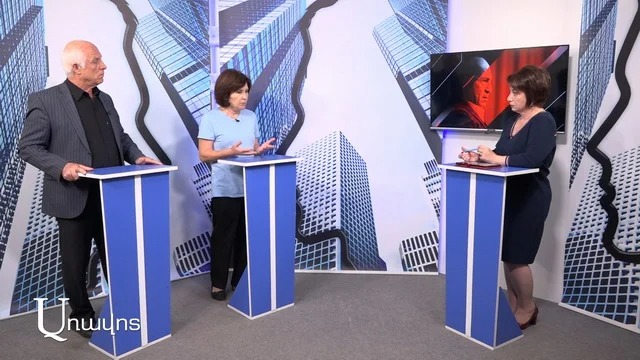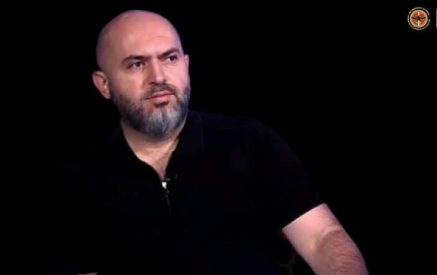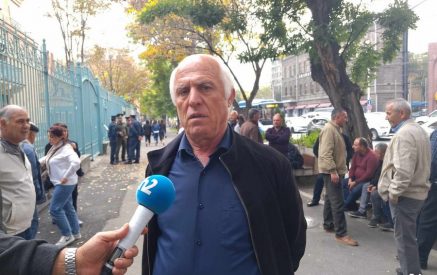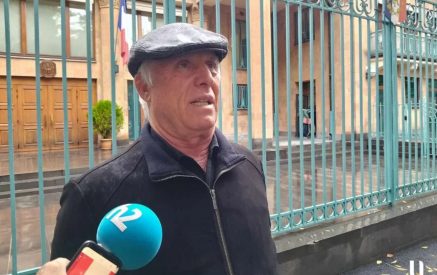“Our position is clear and precise. Karabakh is Azerbaijan. The rights and security of the Armenian population of Karabakh will be ensured in accordance with the Constitution of Azerbaijan. We are not going to discuss our internal issues with anyone. And as far as I understood from the results of the meeting in Prague, this topic did not cause any discrepancies among participants of the four-sided meeting,” Azerbaijani President Ilham Aliyev during a meeting of CIS Heads of State Council held in Astana.
Regarding this announcement, the guest of Aravot’s “Areresum” (“Confrontation”) program, Mariam Avagyan, the coordinator of the Congress of Refugees from the Azerbaijani SSR, said: “Azerbaijan says this because it has a developed military strategy both internally and externally. And when Ilham Aliyev does the job, he knows what he is doing. Whereas our people do some kind of homework every day – sloppy, disorganized. It does not matter on that day what they will say or how they will say it, and whether or not they will cause the nation to panic both in Yerevan and Stepanakert. Yerevan and Stepanakert have both reached their maximum in disorganization. They need to stop. For sure, they have got a heavy legacy, that needs to be mentioned as well. They need to get rid of that heavy legacy firstly by developing a military strategy”.
Despite Azerbaijan’s position, the idea of Baku and Stepanakert establishing direct contact and dialogue is circulating. During the phone call between the minister of foreign affairs of Armenia, Ararat Mirzoyan, US Secretary of State Anthony Blinken, and the minister of foreign affairs of Azerbaijan, Jeyhun Bayramov, according to a message from MFA, they exchanged ideas on the “creation of debate mechanisms between Baku and Stepanakert”. During a Q&A with National Assembly Nikol Pashinyan said: “I think there is some room for negotiation between Nagorno-Karabakh and Azerbaijan”. The other guest of the program, Levon Hayryan, the president of the non-governmental organization “For Hadrut”, said: “Putting the responsibility of the negotiation on Nagorno-Karabakh or its nation has one reason. That reason has been used by Nikol Pashinyan and “Civil Contract” party a couple of times this year”. He brought an example, “They used Nagorno-Karabakh’s government to give away Parukh while organizing a “concert” in Berdzor and Aghavno and sent the minister of territorial administration and Infrastructure to tell the people to get out. Thus, Nikol Pashinyan and “Civil Contract” learned a way out of a situation, where they lose Karabakh. They can just blame Artsakh’s population. This is the dream. They do not want Artsakh to negotiate, succeed, or regain independence to unite with Armenia. No. This is an old policy of washing their hands of it. “So that they won’t be throwing stones at us we will tell them that these people gave Artsakh up, not us.”
The Armenian government is going to decrease the amount of help for Artsakh drastically. In 2023, to support the Artsakh Republic, a loan of 144 million drams was supplied. This is 20 million drams, or 14% less than last year. Mariam Avagyan commented on this fact: “If such restrictions are starting to appear in the budget, this is surely negative news for me. But it needs to be said, that during the last two years, a huge amount of money was given to the post-war, damaged Artsakh Republic, which is a lot more than before the war. But a question always kept arising: how is that money spent?” She later added: “I never understood how the handy Armenian nation wasn’t able to quickly construct new apartments and provide shelter to internal refugees. Where did the finances go?”
Read also
According to the 2023 budget message and the draft of Armenia’s state budget, the goal of Armenia’s government regarding external politics is limited to the following: ensuring the safety of Armenia and Artsakh. There is no longer any question regarding the preservation of the sovereignty, interests, and rights of Artsakh, even the right of self-determination of Artsakh’s nation. Even after the war, during the 2021 National Assembly snap elections, it was fixed in Civil Contract’s pre-election program: “For the upcoming years our main focus will be Artsakh’s national safety and the peaceful and comprehensive regulation of the conflict, based on self-determination of Artsakh’s nation.” The same notion can be seen in the Armenian government’s 2021-2026 program: “The Republic of Armenia is going to continue being the guarantor of Artsakh’s people’s safety, and Artsakh’s safety will be provided by Artsakh’s defense army.” In response to the question, of whether the announcements we hear now are content with documents listed above, Levon Hayryan answered: “A retreat is simply taking place from defending the national interests. They want to put the responsibility of the retreat on each other, that is the case here”.
Anna ISRAELYAN























































